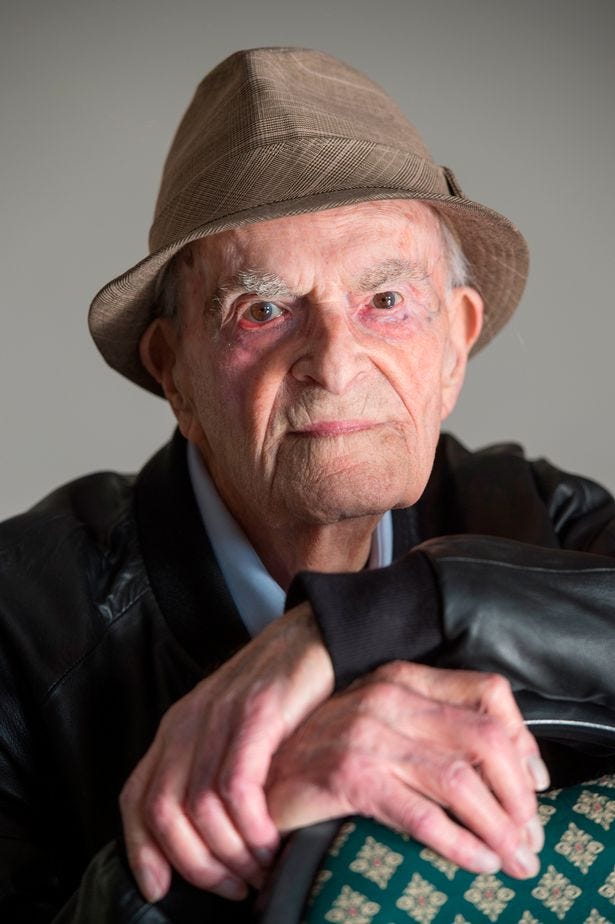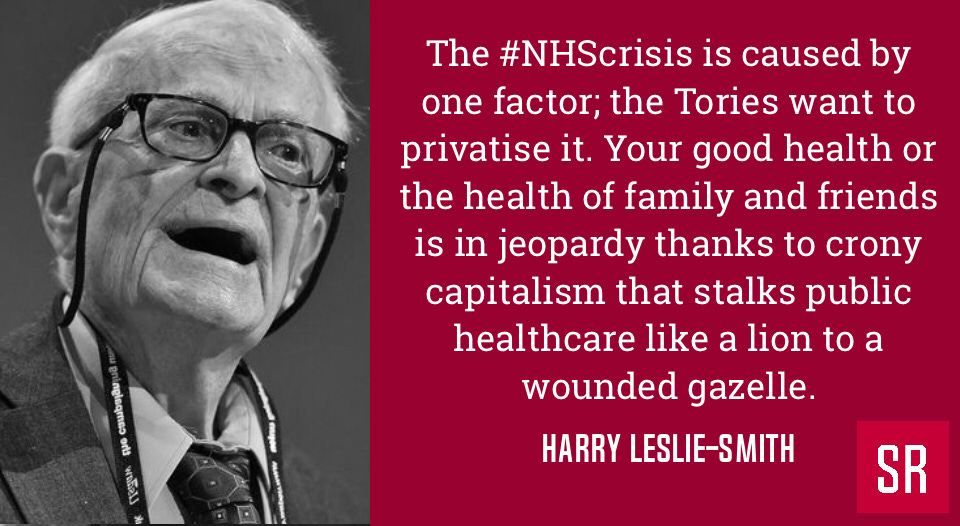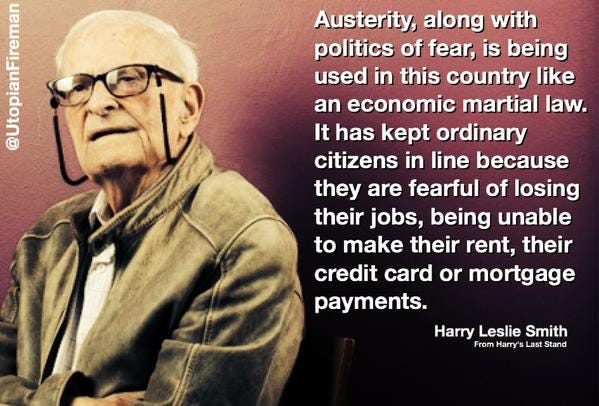"I saw no doctor because there was no money for one." What was past is new again- thanks to neoliberalism.
Harry Leslie Smith
February 25, 1923-November 28, 2018
“I am going out of this World Fighting.”
The Green & Pleasant Land:
Chapter Three
Grief took lodgings in our house after Marion died- and it was not stoic or solemn. It was bitter as tea made with vinegar. Rage steeped in my mother's heart over my sister's death. Mum knew and spoke aloud what Dad kept to himself. "She was snatched from us because we are poor."
No one could console my mother during those first weeks of mourning, least of all her husband.
Dad seemed to my mum too tepid in his hurt over Marion's passing. He didn't wear the emotional accoutrements of mourning. Dad didn't weep or howl because grief had punctured his spirit and deflated his heart. Mum thought my father's reluctance to display emotion over Marion's death was as good as him tugging his forelock at death like a servant to its master.
Mum was being unfair because Dad wasn't lukewarm in his sorrow over Marion's death. He was hot with shame over it. Dad's grief was silent and rheumatic with self-recrimination as he blamed himself for Marion's spiral into death.
My Dad realised hunger induced by participating in the General Strike was a factor in Marion's death from TB. He was the family's breadwinner who failed to put food on our table because the General Strike brought famine to our community and every other mining community across the land.
For the rest of his life, Dad never rid himself of the erroneous notion, that he was responsible for Marion's death and the tragedies that befell our family rather than capitalism, which considered us no better than replaceable livestock.
My sister and I were too young to grieve for Marion. She was here and then gone. To where I did not know? Marion was just absent from our home.
Soon enough, I would understand death and its permanence. I would get to know it, and it would call me by my first name. On too many occasions, Death breathed down my neck over the next twenty years because poverty and war are mortality's best mates.
But in that autumn of 1926, I absented myself from the harshness of sorrow by escaping our home during daylight with my sister. We traipsed through the streets of Barnsley and fell in with other children at play or visited our grandparents who lived close by. For days, I'd lose myself in imaginary treasure hunts with Alberta at a nearby rubbish tip. It was a place strewn with debris from the lives of the working poor: rotting clothes, broken crockery as well as busted furniture heaped in ziggurats.
We scavenged like Howard Carter for Tutankhamen's tomb, looking for loot that we told ourselves was buried underneath the dead ground that only gave up brass buttons from the 19th century.
Marion was dead only a few short months when death tried to barge again into our lives.
This time it came for me. Whooping Cough was my would-be assassin. That sickness left my tiny frame gasping for air, and I came within a whisper of death.
I saw no doctor because there was no money for one. Ancient remedies used by peasants for hundreds of years to combat catarrh kept me alive. Mum shrouded my head with a heavy cloth and made me- breathe in menthol mixed in a bowl of boiling water to ease the congestion in my lungs. My father carried me in his arms and willed me to live with songs and soft words about Christmas that would be soon upon us.
My sickness passed, and death departed our house unfulfilled this time. Death wasn't disappointed- because up until the NHS was formed in 1948, it had free reign to consume as many bairns as it could stomach from my generation who came from the working class.
A daughter dead in October, and a son saved in November, made our Yuletide in 1926 an occasion where funeral and feast danced cheek to cheek.
On that Christmas day, my parents splurged and kept the coal fire in the grate in our cramped parlour- burning from morning until bedtime. The day was joyous with song and merriment. My father played the piano- something he had not done since Marion died. Alberta and I stood beside him and sang well-worn festive jingles with abandon.
Mum prepared our modest holiday feast in a tiny scullery, which was located at the back of the parlour. Our Christmas tea was a small portion of roasted meat that floated on rich gravy that was prevented from flooding off our plates by a mountainous dam of potatoes and parsnips. There was even pudding because Mum baked a jam roll that we washed down with tea- sweet with sugar.
After our meal, I played with my lone gift from Father Christmas; a toy train made in Japan because a British-manufactured toy was too costly for my parents. I sat on a rug woven from the rags of clothes too threadbare to wear and pushed my train across the surrounding stone floor that was icy cold. Near me, my sister admired the doll she was given for Christmas. Alberta and I didn't know it then, but this was the last Christmas when our parents could afford to buy us presents.
At the beginning of the New Year, calamity returned to our house. It came for my dad this time. At fifty-nine, he was no longer up to the job of working at the coalface. Decades beneath the surface, busting rock and coal had broken his body and lungs- he was relocated to surface work.
In his new work, Dad accepted every demeaning command to shovel coal or haul broken equipment away from the mine entrances to preserve his employment. Dad took each order to lift, carry and fetch with good humour because he knew work kept our family out of the poor house. But his body could not keep up with the six-day workweek. The physical demands, the sheer stamina and strength required to work ten hours a day, lifting and dumping scrap were too much for my father. The hernia he'd acquired deep beneath the surface in the world of black coal ruptured above ground when he was ordered to haul away heavy metal beams by himself.
He was done for because a manual labourer who can't before manual labour has no utility in a society that reveres capitalism. Dad was let go from the mine and in an era with insufficient unemployment benefits and where women were discouraged from working outside of the home ensured my family's fate was destitution.
By the time, my fourth birthday arrived at the end of February 1927, our family no longer had money to heat our home with coal. Mum enlisted my sister Alberta and me to scoff coal from a slag heap at one of the collieries near our dwelling. My sister and I would head out to the slag heap on blistering frosty winter days after- we breakfasted on watery porridge.
When we arrived at the base of the slag heap- that was piled high with the jetsam of the mine below. It looked to my four-year-old eyes like an ominous black mountain that had risen from the depths of hell because sections of it smouldered and smoked from bits of coal igniting through friction. My sister and I along, with other children with unemployed dads, ascended the mountain of slag like Sherpas going up Mount Everest.
With my tiny legs, I crawled up to its summit. At the top, I scrambled to fill my bucket with jagged pieces of substandard coal. Day in, and day out, I climbed those heaps of slag at the mouth of the colliery to fill my bucket with broken lumps of coal to keep our house warm and our oven working.
When done, I walked home; my clothes and face were covered in coal dust like I had worked a shift down in the pits below that are as deep and black as the ocean where no sunlight can penetrate.
1927 was the year my family floated in the wreckage caused by my father's unemployment. We subsisted on poor relief and midnight flits. Our welcome in Barnsley was at an end. My mother's family had nowt for us because they were mining folk too, living within a penny of their own ruin. As for my father's family, they had banished him from their hearts when he married my mother. A sister of his lived in Barnsley and owned a pub with her husband, but she refused all pleas from my father for assistance.
By 1928, my family stood like millions of other working-class families on the threshold of the Great Depression. Like them, we didn't know what was coming for us. But we were even less prepared than most working-class people for the economic maelstrom that gathered strength on the horizon. The General Strike, followed by Dad's unemployment, meant; there was no cushion for us or minuscule reserves to draw upon. Everything was used up to survive my father's year of joblessness. Only the strong and unsentimental would survive the last years of the 1920s and the first of the 1930s.
At the start of 1928, my parents skipped out on their debts and fled Barnsley for Bradford with Alberta and me in tow. The bus that delivered us there stank of passengers who couldn’t afford a trip to the public baths and subsisted on fried potatoes and onions. Bradford didn’t promise my family much outside of the slim chance we might keep our heads above water rather than drown in poverty. It all depended on if Dad was able to find work in a larger city.
We now existed to survive- nothing more and nothing less.
This month marks the 5th anniversary of my dad's death. It also marks the second anniversary of my Harry's Last Stand newsletter going live. During these past 24 months, I have posted 245 essays, as well as excerpts from the unpublished works of Harry Leslie Smith - along with chapter samples from my book about him. My newsletter has grown from a handful of subscribers to 1200 in that period. Around 10% of you are paid members. I appreciate all of you but ask if you can switch to a paid subscription because your help is NEEDED to keep me housed and Harry Leslie Smith's legacy relevant. But if you can't all is good too because we are sharing the same boat. Take care, John.








Thank you for posting these remembrances from times past. Perhaps a warning for the future.